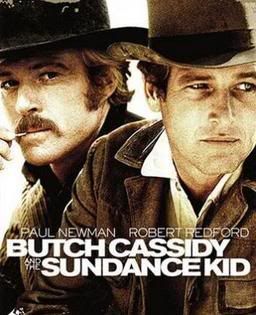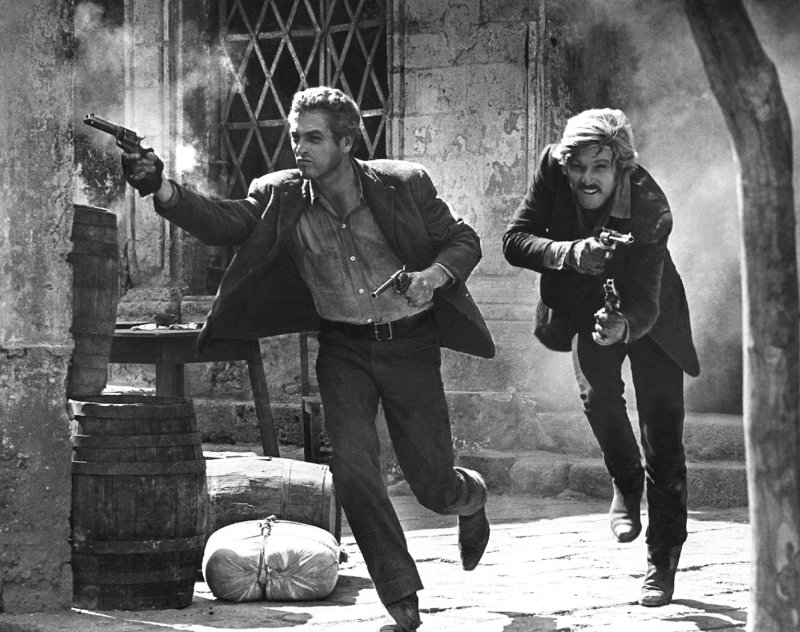

Director: George Roy Hill, 1969.
Butch Cassidy and the Sundance Kid were two real outlaws, depicted in this film as likable rogues, a sort of western Robin Hood and his merry men. In real life they led a gang called "The Wild Bunch." But The Wild Bunch was a Sam Peckinpah film also released in 1969 so their gang is renamed as "The Hole in the Wall Gang."
Paul Newman plays Butch and Robert Redford is Sundance. They are salt and pepper. As Sundance says to Butch, "You just keep thinkin' Butch. That's what you're good at." And Butch replies, "I have vision, and the rest of the world wears bifocals." Butch is the ideas man in the gang, while Sundance is the gunslinger, the skilled shooter. The film is really about them, their friendship and joint adventures.
The gang has been robbing banks and trains for long enough to make the news and become wanted men. Unlike some thieves, they treat the people kindly, trying not to hurt or kill. But when they rob one too many trains, a special posse is hired to find them. This posse is led by an expert Indian tracker. When the gang splits up to escape, Butch and Sundance are the ones the posse follows. And this posse won't give up. Too much of the film is given over to this chase.
 Butch Cassidy is not as much fun as I remembered, when I saw it decades ago for the first time. It certainly has great chemistry between the two stars. Indeed, this was the first of only two films featuring Newman and Redford. (The second, The Sting, was a better film with a superior screenplay and plot.) But it is drawn out and gets slow and tedious towards the end. Even the banter between Butch and Sundance, along with their female friend, Etta Place (Katherine Ross), gets tiresome.
Butch Cassidy is not as much fun as I remembered, when I saw it decades ago for the first time. It certainly has great chemistry between the two stars. Indeed, this was the first of only two films featuring Newman and Redford. (The second, The Sting, was a better film with a superior screenplay and plot.) But it is drawn out and gets slow and tedious towards the end. Even the banter between Butch and Sundance, along with their female friend, Etta Place (Katherine Ross), gets tiresome.What makes Butch Cassidy less compelling is its ambiguous genre. It is a western that morphs into a "Thelma and Louise"-like road movie. Throw in an Oscar-winning Bacharach song, "Raindrops keep falling on my head," and some comedy, and you have this genre-mosaic.
Set around the turn of century, the times were changing. The West was being tamed. Horses were being replaced by motor cars and even bicycles. When the bicycle shows up Butch buys one to show Etta, and takes her for a ride around her farm to the Bacharach tune. Quite why this song or this scene is in the movie is unclear. But it is there.
 When Butch, Sundance and Etts sail for Bolivia in South America, they think they are leaving behind all their problems. But new ones emerge and old ones pursue. The langauage is a barrier and it is fun to see Etta teach the two scoundrels "robbing-bank" phrases in Spanish. As they return to their old ways, they start to build up a notorious reputation as the "Yanqui Bandidos". The leader of the posse, too, shows up, still looking for Butch and Sundance.
When Butch, Sundance and Etts sail for Bolivia in South America, they think they are leaving behind all their problems. But new ones emerge and old ones pursue. The langauage is a barrier and it is fun to see Etta teach the two scoundrels "robbing-bank" phrases in Spanish. As they return to their old ways, they start to build up a notorious reputation as the "Yanqui Bandidos". The leader of the posse, too, shows up, still looking for Butch and Sundance.Deciding to go straight has its problems, too. Ironically, they are given the job of protecting the payroll from robbers. Strother Man, who appeared with Newman in Cool Hand Luke as the prison captain, plays Percy Garris, the American miner in Bolivia eking out a living. He gives them an economics and an ethics lesson. If the payroll is stolen by bandits then the workers, including them, will not get paid. Money does not grow on trees. If it is stolen, this hurts the common workforce. Without pay they will struggle to surivive. Stealing may profit the thieves but will leave the poor peons pained and distressed.
Butch Cassidy and the Sundance Kid look like simple scallywags with cheerful chitchat. But they are really criminals, outlaws. And unlike Robin Hood, they did not give their loot to the poor. They splurged or spent it on themselves, drinking, partying, and gambling. They were really not role-models or heroes. A sheriff friend tells them the truth, straight,-up no holds-barred:
You know, you should have let yourself get killed a long time ago when you had the chance. See, you may be the biggest thing that ever hit this area, but you're still two-bit outlaws. I never met a soul more affable than you, Butch, or faster than the Kid, but you're still nothing but two-bit outlaws on the dodge. It's over, don't you get that? Your time is over and you're gonna die bloody, and all you can do is choose where.
 Whatever they thought of themselves, they were anachronistic law-breakers. Their crimes would catch up with them. They would pay with their lives.
Whatever they thought of themselves, they were anachronistic law-breakers. Their crimes would catch up with them. They would pay with their lives.The main ethical issue with Butch Cassidy and the Sundance Kid is it glamorizes stealing and living the outlaw life. Stealing is wrong. It is a sin. Both stealing and murder are listed in the Ten Commandments (Exod. 20). In the end, they got what they deserved. They reaped the fruit of their choices.
Copyright ©2009, Martin Baggs

No comments:
Post a Comment